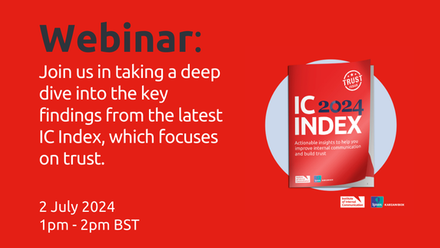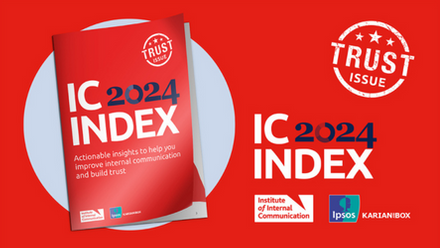In June, the IoIC published the second edition of its IC Index, produced in partnership with Ipsos Karian and Box. This important research explores the impact of internal communication on organisational performance and effectiveness.
This year’s data – based on the survey of a representative sample of 4,000 people working in the UK – reveals headline insights for internal communicators. It highlights the critical role of trust at work in boosting morale, motivation, engagement and results.
The findings of the IC Index underscore the crucial role of internal communication within organisations, not least as they are challenged by increasingly complex operating environments and the ongoing change that has already defined the tumultuous 2020s.
This year’s IC Index shines a torch on the extent of continuous change in our workplaces.
40% of respondents told us their organisation had restructured in the past 12 months. 22% said there had been redundancies as a result and 19% said they had witnessed a change of CEO.
AI, the escalating climate crisis, rising social inequality, shifting attitudes towards work, evolving employment preferences, intergenerational workplace dynamics, geopolitical tensions and more – modern businesses have a catalogue of issues to address.
Each and all of these require a substantial overhaul of both how we organise ourselves work and – at a meta level – how our organisations are perceived to generate and deliver value.
Continuous change at work is the new normal
Across the board, its clear radical transformation is needed in the way organisations are structured and led. Furthermore, ongoing market ambiguity means the pace of change at work is only set to accelerate.
Yet consistent research shows the majority of business transformation programmes fail. Management consultant McKinsey leads this narrative, pointing to a 70% failure rate and pinpointing several key reasons why.
A primary reason for business transformation failure is a lack of compelling narrative. Too often the story behind the reason for change isn’t widely communicated throughout the organisation.
Simply put, internal stakeholders – those who are both impacted by the proposed changes and ultimately most responsible for shifting their behaviours and working practices – don’t ‘buy in’ because they don’t have a substantive reason for doing so.

Transformation is a human endeavour
Another reason for change programme failure is a lack of appreciation of the human factors that drive successful transformation.
For an organisation to change itself effectively, it must recognise itself as a living system of individual contributors. Each individual that works within that organisation must be willing to adapt their daily working practices to integrate new modes of operation. Understanding the individual desires and motivations of each workplace contributor, and how they conceive of themselves as existing within the wider organisation, is therefore key.
And the impact of change itself cannot be underestimated. Research by Gartner reveals the impact of continuous change on individuals at a personal level. 73% of change-affected employees experience moderate to high stress levels. Those suffering from change-related stress perform 5% worse than the average employee.
It’s clear that business transformation of any kind is deeply personal.
The critical role of internal communication
The 2024 IC Index provides useful data that substantiates the crucial role of internal communication in sustainable organisational transformation.
According to the research, one in three believe clarity, honesty and listening are essential components of successful change programmes. The data shows we also want more detail about the change plan itself and for our employers to involve us in change discourse sooner, rather than later.
Where internal communication is perceived as excellent by employees during restructuring, openness and honesty is rated at 93%. In addition, when internal comms is rated as excellent during restructuring, 78% say they trust their organisation’s senior leadership team.
What the IC Index also reveals however is that far too few line managers are competent in communicating change. Only 11% have received any training in this area, which is potentially disastrous for organisations, given the extent to which transformation success depends on effective internal communication.
A final significant finding of the IC Index is that only 32% of internal communicators say they are asked to act as strategic advisors in change programmes. Worryingly, this indicates that far too few organisations recognise internal communication as a vital component of transformation success. And if organisations are to stand any chance of successfully responding, evolving and adapting to new operating realities, this itself needs to change.
So, what can internal communicators do?
By taking a proactive stance, internal communicators are in a great position to demonstrate strategic value. Educating colleagues on the impact of effective internal communication is a great starting point.
Here are some ideas for how best to get the ball rolling:
1. Collate the various research showing why transformation programmes fail and highlight the integral role of internal communication in change success.
2. Get involved in change programmes from the outset and take responsibility for shaping the change narrative.
3. Educate change managers and senior stakeholders on the realities of change fatigue and drive an agenda that humanises change so that transformation programmes are designed more inclusively and compassionately.
4. Prioritise listening to internal stakeholders. At times of change, it’s particularly important to allow colleagues to have their say. First and foremost, transformation success depends on their buy-in and so it’s key to allow the time and space for concerns to be aired and addressed. Secondly, this exercise will likely yield invaluable insights for how change progress might be improved – your colleagues will inevitably have far greater situational knowledge than those driving change from a centralised function.
Conclusion
Effective internal communication is an essential component of organisational transformation and the wider future of work. Not only does it provide clarity, but it alleviates stress and anxiety, helping internal stakeholders better understand what’s going on and why.
Despite all the many challenges facing modern organisations and the inevitability of business transformation, creating stable operating environments for internal stakeholders is key.
A better understanding of what internal stakeholders seek from their employers as they navigate continuous change reinforces the value of internal communication. For organisations to successfully transform, ongoing investment in internal communication is an invaluable business investment.






